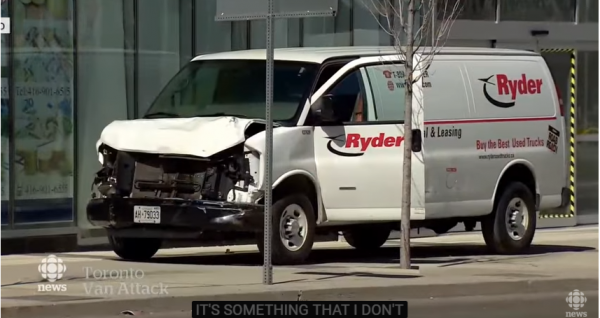
News coverage of Monday’s deadly Toronto sidewalk rampage seems to be subsiding, raising suspicions among some in the firearms community that the reason is because a gun wasn’t involved in the murders of ten pedestrians with a rental van as the weapon of choice.
The dual standard of public angst was not lost on the leader of a national gun rights organization, the Citizens Committee for the Right to Keep and Bear Arms (CCRKBA). Chairman Alan Gottlieb, in discussing what he called “a horrible tragedy,” challenged the “liberal media” to start using the term “assault vehicle.”
“Or,” he added, “simply call these killing machines ‘assault weapons.’”
Gottlieb could have a legitimate point.
“Fatal vehicle attacks have been increasing,” he noted. “The 2016 Nice terror attack killed more than 80 people. Last year a man driving a rental truck killed eight people on a bicycle path in New York City. Also last year, 13 people were killed in Barcelona, eight more died in a car attack in London and four were killed in Stockholm. If a gun had been the weapon instead of a vehicle, all of those would have been mass shootings.”
And they would also have been fueling protests outside of gun shows, and marches through the streets of liberal enclaves such as Seattle, San Francisco, and perhaps Washington, D.C. But guns were not involved, so there was no opportunity to demonize Gottlieb’s grassroots action group, or the National Rifle Association, gun owners in general, their firearms or the Second Amendment.
Using the rhetoric of the gun prohibition lobby, Gottlieb wondered how to define or describe an “assault vehicle.”
“Is it a van or truck,” he puzzled. “Does it have a high-powered engine? Does it have an automatic transmission? Can it be fitted with a high capacity fuel tank? Do they all come in solid black, or are other colors available? Can they be equipped with large mufflers to suppress engine noise? Once we define them, should we ban them, require special training to operate them, or just raise the age limit to buy or rent one?”
“Or is the problem the individual driver,” he questioned, “rather than the equipment he turns into a weapon. Once you realize how absurd it is to call a car an ‘assault vehicle,’ you see the lunacy of defining, and then banning, so-called ‘assault rifles.’”
When CBS News did a follow-up on the Monday mayhem, it quoted Meena Chowdry, who had come to Toronto to join others in paying respects to the van attack victims. She had an interesting observation.
“I needed to come here to show that I’m not afraid of this city,” she said. “That one man’s actions cannot taint an otherwise beautiful, welcoming city.”
Indeed, Gottlieb would agree, fix blame where it belongs, on the suspected perpetrator.
“We need to focus the blame where it belongs,” he said, “on the deranged, violent person who commits the violent act. We don’t reflexively demonize every other motorist for the acts of a madman, so why do some people insist on penalizing every gun owner for the acts of criminals?”
Anti-gunners cannot, or simply don’t want, to make that leap in logic. That may be best illustrated by a Thursday National Review column authored by Robert L. Ehrlich, Jr. Headlined “Talking Past Each Other on Gun Control,” Ehrlich’s essay is “distillation of conversations” he recently had with pro-gun control acquaintances that did not so much illustrate people talking past one another, but more accurately revealed the anti-gun mindset: It’s about eliminating guns, not horrible crimes.
Writing in USA Today, Christian Schneider, an opinion editor at the Milwaukee Journal-Sentinel, noted how one California congressman quickly tried to exploit Sunday’s Nashville Waffle House shooting:
“Hours later, with the gunman still at large, Democrat Ted Lieu of California tweeted to Republican House Speaker Paul Ryan, asking when he would ‘stop silencing’ them and allow them to debate gun safety measures in the House. ‘You’re quitting,’ Lieu wrote. ‘You no longer need to be beholden to @NRA.’
“While Lieu’s tweet is a despicable piece of political opportunism, it’s hardly unique.”
Indeed, political opportunism is the name of the game for the gun prohibition lobby. In an email message to justify its new anti-gun-rights initiative effort in Washington State, the billionaire-backed Alliance for Gun Responsibility, a Seattle-based gun control group tried this sales pitch:
“We didn’t want to have to put together this initiative. We had to – because the Washington State legislature failed to step up this year to pass lifesaving legislation.
“The Reduce Assault Weapon Violence Initiative addresses many root causes of recent tragedies. It would raise the minimum age to purchase semi-automatic weapons to 21, implement Enhanced Assault Weapon Background checks, hold gun owners responsible if unsafely stored firearms are used by children or other prohibited persons, ensure continued eligibility to possess or purchase assault weapons, require informed consent at the point of firearm purchase, and establish a 10-day waiting period for assault weapon purchases.
“Earlier this year, in spite of unprecedented calls for action, the Washington State legislature failed to pass a bill that would’ve made our schools and communities safer from gun violence.”
According to many of the activists gathered last Saturday on the Washington State Capitol steps in Olympia, there is no credible evidence that any of this anti-gun group’s proposals would prevent a single violent crime. The initiative was announced about 24 hours ahead of the Olympia gathering and it only served to harden the resolve of gun owners to fight back.
“Gun Responsibility” is camo-speak for “gun control.” The group’s initiative, if it gathers enough signatures, will qualify for the November ballot. Between now and then, a lot of energy will be spent on both sides over a measure that, if it becomes law, might only penalize law-abiding citizens, and especially young adults, while failing to prevent a single tragedy.
The Alliance’s earlier initiative effort, the I-594 background check measure, was passed in 2014. The tragic Mukilteo party shooting, and the Cascade Mall shooting in Burlington, happened in 2016.
